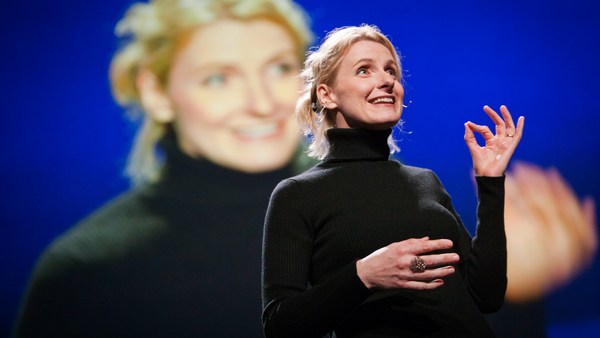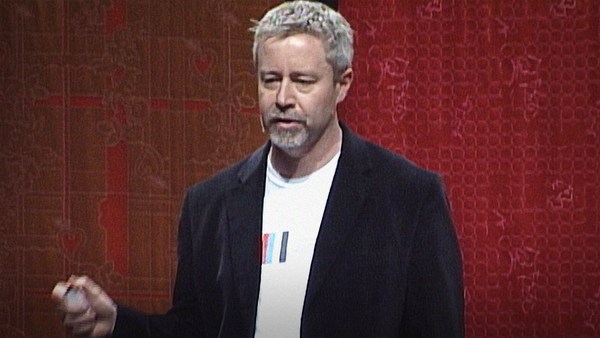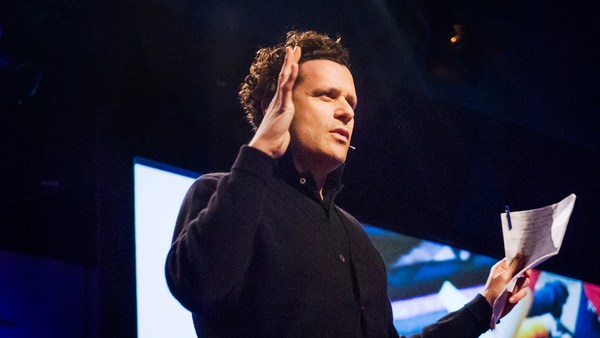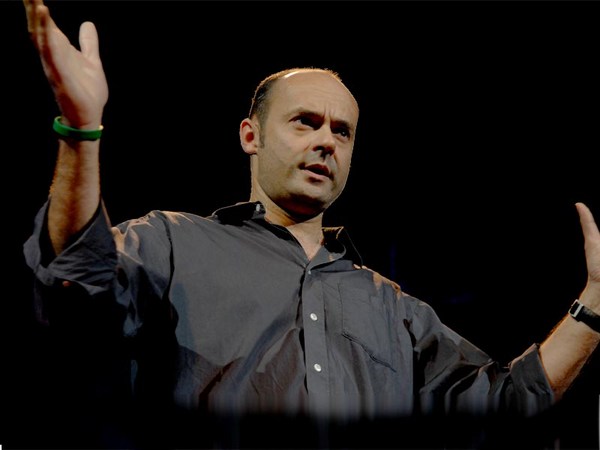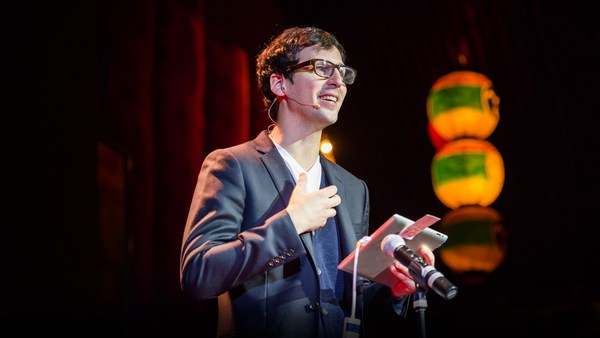So, I was just asked to go and shoot this film called "Elizabeth." And we're all talking about this great English icon and saying, "She's a fantastic woman, she does everything. How are we going to introduce her?" So we went around the table with the studio and the producers and the writer, and they came to me and said, "Shekhar, what do you think?"
And I said, "I think she's dancing."
And I could see everybody looked at me, somebody said, "Bollywood."
The other said, "How much did we hire him for?"
And the third said, "Let's find another director."
I thought I had better change. So we had a lot of discussion on how to introduce Elizabeth, and I said, "OK, maybe I am too Bollywood. Maybe Elizabeth, this great icon, dancing? What are you talking about?" So I rethought the whole thing, and then we all came to a consensus. And here was the introduction of this great British icon called "Elizabeth."
Leicester: May I join you, my lady?
Elizabeth: If it please you, sir. (Music)
Shekhar Kapur: So she was dancing. So how many people who saw the film did not get that here was a woman in love, that she was completely innocent and saw great joy in her life, and she was youthful? And how many of you did not get that? That's the power of visual storytelling, that's the power of dance, that's the power of music: the power of not knowing.
When I go out to direct a film, every day we prepare too much, we think too much. Knowledge becomes a weight upon wisdom. You know, simple words lost in the quicksand of experience. So I come up, and I say, "What am I going to do today?" I'm not going to do what I planned to do, and I put myself into absolute panic. It's my one way of getting rid of my mind, getting rid of this mind that says, "Hey, you know what you're doing. You know exactly what you're doing. You're a director, you've done it for years." So I've got to get there and be in complete panic. It's a symbolic gesture. I tear up the script, I go and I panic myself, I get scared. I'm doing it right now; you can watch me. I'm getting nervous, I don't know what to say, I don't know what I'm doing, I don't want to go there.
And as I go there, of course, my A.D. says, "You know what you're going to do, sir." I say, "Of course I do."
And the studio executives, they would say, "Hey, look at Shekhar. He's so prepared." And inside I've just been listening to Nusrat Fateh Ali Khan because he's chaotic. I'm allowing myself to go into chaos because out of chaos, I'm hoping some moments of truth will come. All preparation is preparation. I don't even know if it's honest. I don't even know if it's truthful. The truth of it all comes on the moment, organically, and if you get five great moments of great, organic stuff in your storytelling, in your film, your film, audiences will get it. So I'm looking for those moments, and I'm standing there and saying, "I don't know what to say."
So, ultimately, everybody's looking at you, 200 people at seven in the morning who got there at quarter to seven, and you arrived at seven, and everybody's saying, "Hey. What's the first thing? What's going to happen?" And you put yourself into a state of panic where you don't know, and so you don't know. And so, because you don't know, you're praying to the universe because you're praying to the universe that something -- I'm going to try and access the universe the way Einstein -- say a prayer -- accessed his equations, the same source. I'm looking for the same source because creativity comes from absolutely the same source that you meditate somewhere outside yourself, outside the universe. You're looking for something that comes and hits you. Until that hits you, you're not going to do the first shot. So what do you do?
So Cate says, "Shekhar, what do you want me to do?"
And I say, "Cate, what do you want to do?" (Laughter) "You're a great actor, and I like to give to my actors -- why don't you show me what you want to do?" (Laughter) What am I doing? I'm trying to buy time. I'm trying to buy time.
So the first thing about storytelling that I learned, and I follow all the time is: Panic. Panic is the great access of creativity because that's the only way to get rid of your mind. Get rid of your mind. Get out of it, get it out. And let's go to the universe because there's something out there that is more truthful than your mind, that is more truthful than your universe. [unclear], you said that yesterday. I'm just repeating it because that's what I follow constantly to find the shunyata somewhere, the emptiness. Out of the emptiness comes a moment of creativity. So that's what I do.
When I was a kid -- I was about eight years old. You remember how India was. There was no pollution. In Delhi, we used to live -- we used to call it a chhat or the khota. Khota's now become a bad word. It means their terrace -- and we used to sleep out at night. At school I was being just taught about physics, and I was told that if there is something that exists, then it is measurable. If it is not measurable, it does not exist. And at night I would lie out, looking at the unpolluted sky, as Delhi used to be at that time when I was a kid, and I used to stare at the universe and say, "How far does this universe go?"
My father was a doctor. And I would think, "Daddy, how far does the universe go?"
And he said, "Son, it goes on forever."
So I said, "Please measure forever because in school they're teaching me that if I cannot measure it, it does not exist. It doesn't come into my frame of reference." So, how far does eternity go? What does forever mean? And I would lie there crying at night because my imagination could not touch creativity.
So what did I do? At that time, at the tender age of seven, I created a story. What was my story? And I don't know why, but I remember the story. There was a woodcutter who's about to take his ax and chop a piece of wood, and the whole galaxy is one atom of that ax. And when that ax hits that piece of wood, that's when everything will destroy and the Big Bang will happen again. But all before that there was a woodcutter. And then when I would run out of that story, I would imagine that woodcutter's universe is one atom in the ax of another woodcutter. So every time, I could tell my story again and again and get over this problem, and so I got over the problem.
How did I do it? Tell a story. So what is a story? A story is our -- all of us -- we are the stories we tell ourselves. In this universe, and this existence, where we live with this duality of whether we exist or not and who are we, the stories we tell ourselves are the stories that define the potentialities of our existence. We are the stories we tell ourselves. So that's as wide as we look at stories. A story is the relationship that you develop between who you are, or who you potentially are, and the infinite world, and that's our mythology.
We tell our stories, and a person without a story does not exist. So Einstein told a story and followed his stories and came up with theories and came up with theories and then came up with his equations. Alexander had a story that his mother used to tell him, and he went out to conquer the world. We all, everybody, has a story that they follow. We tell ourselves stories. So, I will go further, and I say, "I tell a story, and therefore I exist." I exist because there are stories, and if there are no stories, we don't exist. We create stories to define our existence. If we do not create the stories, we probably go mad. I don't know; I'm not sure, but that's what I've done all the time.
Now, a film. A film tells a story. I often wonder when I make a film -- I'm thinking of making a film of the Buddha -- and I often wonder: If Buddha had all the elements that are given to a director -- if he had music, if he had visuals, if he had a video camera -- would we get Buddhism better? But that puts some kind of burden on me. I have to tell a story in a much more elaborate way, but I have the potential. It's called subtext. When I first went to Hollywood, they said -- I used to talk about subtext, and my agent came to me, "Would you kindly not talk about subtext?" And I said, "Why?" He said, "Because nobody is going to give you a film if you talk about subtext. Just talk about plot and say how wonderful you'll shoot the film, what the visuals will be."
So when I look at a film, here's what we look for: We look for a story on the plot level, then we look for a story on the psychological level, then we look for a story on the political level, then we look at a story on a mythological level. And I look for stories on each level. Now, it is not necessary that these stories agree with each other. What is wonderful is, at many times, the stories will contradict with each other. So when I work with Rahman who's a great musician, I often tell him, "Don't follow what the script already says. Find that which is not. Find the truth for yourself, and when you find the truth for yourself, there will be a truth in it, but it may contradict the plot, but don't worry about it."
So, the sequel to "Elizabeth," "Golden Age." When I made the sequel to "Elizabeth," here was a story that the writer was telling: A woman who was threatened by Philip II and was going to war, and was going to war, fell in love with Walter Raleigh. Because she fell in love with Walter Raleigh, she was giving up the reasons she was a queen, and then Walter Raleigh fell in love with her lady in waiting, and she had to decide whether she was a queen going to war or she wanted...
Here's the story I was telling: The gods up there, there were two people. There was Philip II, who was divine because he was always praying, and there was Elizabeth, who was divine, but not quite divine because she thought she was divine, but the blood of being mortal flowed in her. But the divine one was unjust, so the gods said, "OK, what we need to do is help the just one." And so they helped the just one. And what they did was, they sent Walter Raleigh down to physically separate her mortal self from her spirit self. And the mortal self was the girl that Walter Raleigh was sent, and gradually he separated her so she was free to be divine. And the two divine people fought, and the gods were on the side of divinity.
Of course, all the British press got really upset. They said, "We won the Armada."
But I said, "But the storm won the Armada. The gods sent the storm."
So what was I doing? I was trying to find a mythic reason to make the film. Of course, when I asked Cate Blanchett, I said, "What's the film about?" She said, "The film's about a woman coming to terms with growing older." Psychological. The writer said "It's about history, plot." I said "It's about mythology, the gods."
So let me show you a film -- a piece from that film -- and how a camera also -- so this is a scene, where in my mind, she was at the depths of mortality. She was discovering what mortality actually means, and if she is at the depths of mortality, what really happens. And she's recognizing the dangers of mortality and why she should break away from mortality. Remember, in the film, to me, both her and her lady in waiting were parts of the same body, one the mortal self and one the spirit self.
So can we have that second?
(Music)
Elizabeth: Bess? Bess? Bess Throckmorton?
Bess: Here, my lady.
Elizabeth: Tell me, is it true? Are you with child? Are you with child?
Bess: Yes, my lady.
Elizabeth: Traitorous. You dare to keep secrets from me? You ask my permission before you rut, before you breed. My bitches wear my collars. Do you hear me? Do you hear me?
Walsingham: Majesty. Please, dignity. Mercy.
Elizabeth: This is no time for mercy, Walsingham. You go to your traitor brother and leave me to my business. Is it his? Tell me. Say it. Is the child his? Is it his?
Bess: Yes. My lady, it is my husband's child. Elizabeth: Bitch! (Cries)
Raleigh: Majesty. This is not the queen I love and serve.
Elizabeth: This man has seduced a ward of the queen, and she has married without royal consent. These offenses are punishable by law. Arrest him. Go. You no longer have the queen's protection.
Bess: As you wish, Majesty.
Elizabeth: Get out! Get out! Get out! Get out.
(Music)
Shekhar Kapur: So, what am I trying to do here? Elizabeth has realized, and she's coming face-to-face with her own sense of jealousy, her own sense of mortality. What am I doing with the architecture? The architecture is telling a story. The architecture is telling a story about how, even though she's the most powerful woman in the world at that time, there is the other, the architecture's bigger. The stone is bigger than her because stone is an organic. It'll survive her. So it's telling you, to me, stone is part of her destiny. Not only that, why is the camera looking down? The camera's looking down at her because she's in the well. She's in the absolute well of her own sense of being mortal. That's where she has to pull herself out from the depths of mortality, come in, release her spirit. And that's the moment where, in my mind, both Elizabeth and Bess are the same person. But that's the moment she's surgically removing herself from that. So the film is operating on many many levels in that scene. And how we tell stories visually, with music, with actors, and at each level it's a different sense and sometimes contradictory to each other. So how do I start all this? What's the process of telling a story?
About ten years ago, I heard this little thing from a politician, not a politician that was very well respected in India. And he said that these people in the cities, in one flush, expend as much water as you people in the rural areas don't get for your family for two days. That struck a chord, and I said, "That's true." I went to see a friend of mine, and he made me wait in his apartment in Malabar Hill on the twentieth floor, which is a really, really upmarket area in Mumbai. And he was having a shower for 20 minutes. I got bored and left, and as I drove out, I drove past the slums of Bombay, as you always do, and I saw lines and lines in the hot midday sun of women and children with buckets waiting for a tanker to come and give them water. And an idea started to develop. So how does that become a story? I suddenly realized that we are heading towards disaster.
So my next film is called "Paani" which means water. And now, out of the mythology of that, I'm starting to create a world. What kind of world do I create, and where does the idea, the design of that come? So, in my mind, in the future, they started to build flyovers. You understand flyovers? Yeah? They started to build flyovers to get from A to B faster, but they effectively went from one area of relative wealth to another area of relative wealth. And then what they did was they created a city above the flyovers. And the rich people moved to the upper city and left the poorer people in the lower cities, about 10 to 12 percent of the people have moved to the upper city.
Now, where does this upper city and lower city come? There's a mythology in India about -- where they say, and I'll say it in Hindi, [Hindi] Right. What does that mean? It says that the rich are always sitting on the shoulders and survive on the shoulders of the poor. So, from that mythology, the upper city and lower city come. So the design has a story.
And now, what happens is that the people of the upper city, they suck up all the water. Remember the word I said, suck up. They suck up all the water, keep to themselves, and they drip feed the lower city. And if there's any revolution, they cut off the water. And, because democracy still exists, there's a democratic way in which you say "Well, if you give us what [we want], we'll give you water."
So, okay my time is up. But I can go on about telling you how we evolve stories, and how stories effectively are who we are and how these get translated into the particular discipline that I am in, which is film. But ultimately, what is a story? It's a contradiction. Everything's a contradiction. The universe is a contradiction. And all of us are constantly looking for harmony. When you get up, the night and day is a contradiction. But you get up at 4 a.m. That first blush of blue is where the night and day are trying to find harmony with each other. Harmony is the notes that Mozart didn't give you, but somehow the contradiction of his notes suggest that. All contradictions of his notes suggest the harmony. It's the effect of looking for harmony in the contradiction that exists in a poet's mind, a contradiction that exists in a storyteller's mind. In a storyteller's mind, it's a contradiction of moralities. In a poet's mind, it's a conflict of words, in the universe's mind, between day and night. In the mind of a man and a woman, we're looking constantly at the contradiction between male and female, we're looking for harmony within each other.
The whole idea of contradiction, but the acceptance of contradiction is the telling of a story, not the resolution. The problem with a lot of the storytelling in Hollywood and many films, and as [unclear] was saying in his, that we try to resolve the contradiction. Harmony is not resolution. Harmony is the suggestion of a thing that is much larger than resolution. Harmony is the suggestion of something that is embracing and universal and of eternity and of the moment. Resolution is something that is far more limited. It is finite; harmony is infinite. So that storytelling, like all other contradictions in the universe, is looking for harmony and infinity in moral resolutions, resolving one, but letting another go, letting another go and creating a question that is really important.
Thank you very much. (Applause)
